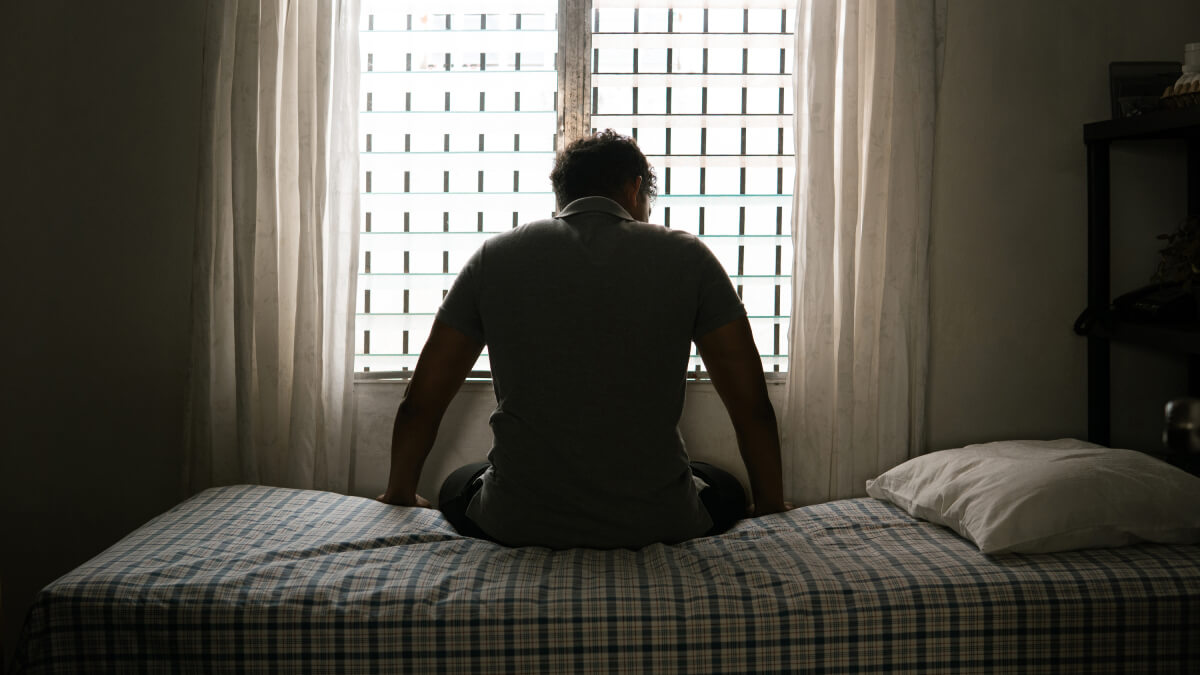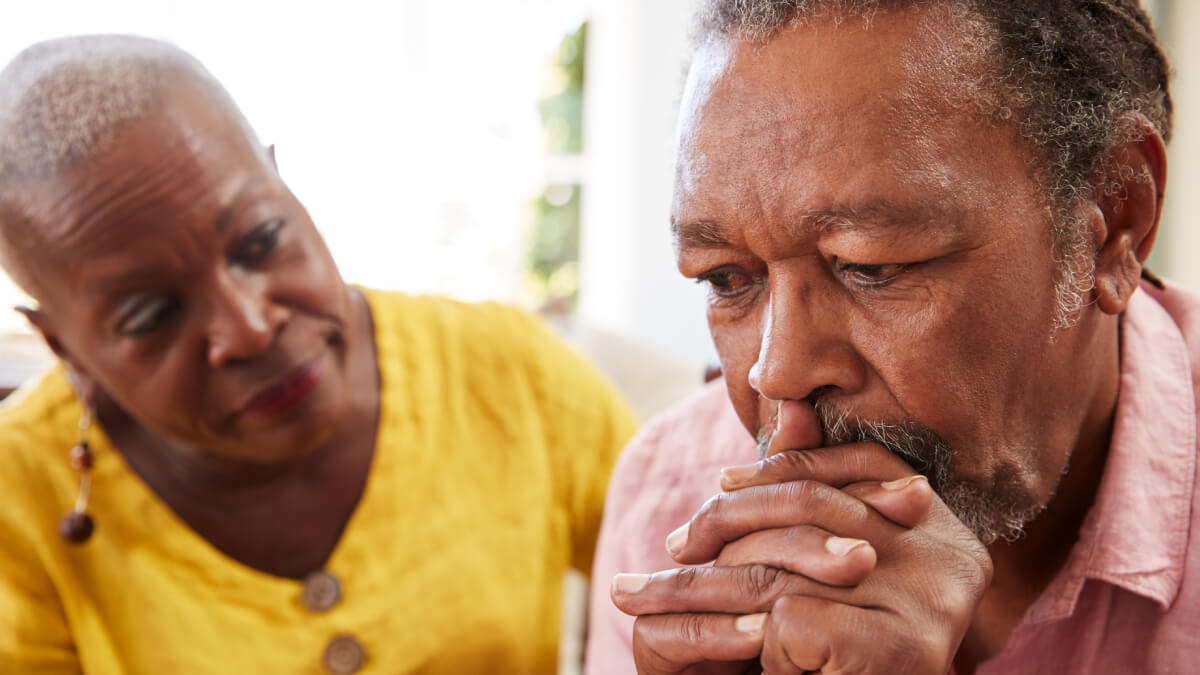Around 280 million people globally have been diagnosed with depression, making it one of the most common mental health problems in the world. It’s usually characterised by feelings of sadness, irritability, and withdrawal. However, depression can reveal itself in different ways from person to person. From intense headaches to rapid changes in weight, depression’s symptoms cover a broad scope of our health. That’s why understanding and identifying them can help us and our loved ones get the help we need as soon as possible. So, what are the signs of depression, and how can you help someone who might be displaying these symptoms? In this article, we’ll explain exactly that and give you the confidence to take action.
Understanding Mental Health: What Are The Signs Of Depression?
An estimated 60% of those with depression do not seek professional support and never get it diagnosed. That number rises to 75% for those in low or middle-income countries. From costs to the stigma surrounding mental illness, there are a variety of reasons those suffering choose not to get an official diagnosis. One that is not often addressed is that many individuals don’t realise they are displaying symptoms of depression. Due to the broad range of depressive symptoms, it can be easy to miss or not understand the signs when they arrive.
- What Are The Causes Of Depression?
- What Are The Symptoms Of Depression?
- What Are The Types Of Depression?
- What Is Clinical Depression?
- How can you help a depressed person?

What Are The Causes Of Depression?
There is no single cause for depression, and its triggers will be different from person to person. Often, it’s caused by genetics and biology; other times, it can be attributed to social or environmental factors. Different causes can combine to trigger depression, and those suffering often describe a ‘downward spiral’ that led them to where they are. For example, an important relationship might end in an individual’s life, causing them to be more withdrawn and increase their dependence on substances. These factors combined can trigger depression. These are some of the most common causes of depression:
Stressful And Traumatic Events
Stressful events like bereavement or breakups can take time to come to terms with. It’s very common for those going through things like this to stop seeing their friends and family, limiting their social interactions. This reaction increases an individual’s risk of depression following an intensely stressful or traumatic event.
Brain Chemistry
For many, the cause of depression is entirely biological. An imbalance of neurotransmitters, including serotonin, norepinephrine and dopamine, contributes to the development of depression. Medication is often prescribed in an effort to revert these imbalances.
Personality
Certain personality traits like low self-esteem or being overly self-critical make individuals more susceptible to depression. Often, this mindset is inherited from parents or established from early life experiences.
Family History
If members of your family have had depression in the past, it is more likely that you’ll also develop it. It is thought that severe depression, in particular, has a close connection to the genes inherited from your parents. However, a family history of depression does not guarantee it in you, as it’s usually caused by a combination of triggers.
Loneliness
Loneliness and a lack of social interaction are one of the leading causes of depression. Perceived social isolation is also a cause of depression, which partly explains why rates of depression increase at highly social times of the year, like Christmas.
Alcohol And Drugs
Often part of the ‘downward spiral’ that leads to depression, many people turn to alcohol and drugs when life is getting them down. These substances affect your brain chemistry, increasing the risk of depression.
Illness
Those with longstanding or life-threatening illnesses are at a higher risk of depression. This includes coronary heart disease, cancer, or a condition that causes long-term pain. Additionally, severe head injuries can trigger mood swings and emotional problems, leading to an increased risk of depression.

What Are The Symptoms Of Depression?
Depression’s symptoms are complex and often difficult to quantify. They vary widely between cases, and severe symptoms in some individuals may not be present in others. These are some of the main symptoms of depression:
Psychological
- Continuous low mood or sadness
- Feeling hopeless and helpless
- Having low self-esteem
- Feeling tearful
- Feeling guilt-ridden
- Feeling irritable and intolerant of others
- Having no motivation or interest in things
- Finding it difficult to make decisions
- Not getting any enjoyment out of life
- Feeling anxious or worried
- Having suicidal thoughts or thoughts of harming yourself
Physical
- Moving or speaking more slowly than usual
- Changes in appetite or weight (usually decreased, but sometimes increased)
- Constipation
- Unexplained aches and pains
- Lack of energy
- Low sex drive
- Disturbed sleep – for example, finding it difficult to fall asleep at night or waking up very early in the morning
Social
- Avoiding contact with friends and taking part in fewer social activities
- Neglecting your hobbies and interests
- Having difficulties in your home, work or family life

What Are The Types Of Depression?
With these causes and symptoms in mind, depression can be categorised and broken into types. These are some of the most common forms of depression:
- Major Depressive Disorder: One of the most common disorders in which the typical symptoms of depression are prevalent for at least two weeks.
- Persistent Depressive Disorder: A form of depression where the symptoms are present more days than not for at least two years. It can be mild, moderate, or severe.
- Bipolar Disorder: Involves episodes of depression alternating with periods of mania. Fatigue and insomnia are particularly common in this form of depression.
- Seasonal Affective Disorder: Symptoms of depression reveal themself in tandem with the seasons, usually in winter. It is believed to be linked to disturbances in the body’s circadian rhythm caused by variations in the night/day pattern.
- Atypical Depression: Depression that can temporarily lift in response to positive events. Symptoms may include increased appetite, weight gain, excessive sleep, and a heavy feeling in the limbs.

What Is Clinical Depression?
Clinical depression, also known as major depressive disorder (MDD), is a chronic and severe form of depression. For a diagnosis, the common symptoms of depression (lasting feelings of unhappiness and hopelessness, loss of interest in things you used to enjoy, constantly tired) must be present for at least two weeks. Despite being chronic, it usually occurs in episodes lasting several weeks or months. Those with clinical depression have a greater chance of suffering from other mental health conditions, like substance use disorder, panic disorder and social anxiety disorder.
MDD can affect anyone at any age, but cases are most prevalent among those in their 20s. It’s most likely to affect those without close interpersonal relationships and those who are divorced, separated or widowed. Research suggests around 5-17% of people will experience clinical depression at some point in their lives, with the majority of those affected being female.

How can you help a depressed person?
If someone you know is struggling with depression or you think they might be displaying some of its symptoms, it can be difficult to support them in a way they feel comforable with. Some of depression’s main symptoms are feeling irritable, withdrawn, and helpless, so it is the nature of the condition to reject support from friends and family. That’s why the best way to help is to be open, receptive, and non-judgemental. It’s usually very difficult for those with depression to discuss their emotions, so let them know you’re ready to talk about whatever they want whenever they’re ready.
If they do begin to discuss how they’re feeling with you, some of the things they say might be difficult to understand, but it’s important not to be critical. Don’t blame them or put pressure on them to get better straight away. It’s more than likely that they’re already very critical towards themselves, so try not to reinforce that mindset. Once this dialogue is open, do your best to stay in touch. It might be hard for someone with depression to find the energy to keep lines of communication open, so a simple text letting them know you’re thinking of them goes a long way.
When someone you know is experiencing depression, this can quickly become the focus of your relationship. But it’s important to remember this is only one aspect of their life. Try to keep doing the things you’d usually do together. Encourage them to do practical things with you, like housework and cooking, even if you might want to take care of everything for them.
It’s important to remember that depression is a highly complex mental disorder, and the likelihood is you’re not a trained mental health professional. So, while you can support them in the ways outlined above, therapy and counselling remain the leading treatment methods for depression. Encourage them to seek help and check out what services are available to them. Support them by taking them to appointments and making them as accessible as possible. If they reject any help or services you offer, be patient and provide reassurance to ensure they feel comfortable if they change their mind.
Looking after someone struggling with depression can put a strain on your well-being, so be sure to take care of your mental health, too. Try not to feel guilty about taking time to look after yourself because this will put you in the best position to provide top-quality care.

The Bottom Line
Depression is complicated, unpreventable, and difficult to treat. However, equipped with this detailed understanding of the condition, you’re in the best possible position to support yourself and those around you should anyone begin to struggle. If you want to better understand other aspects of mental health or are looking for further support with your well-being, explore the rest of the LADZ app. Check out our catalogue of informative mental health articles and our extensive network of mental health professionals for access to all the support you need.




